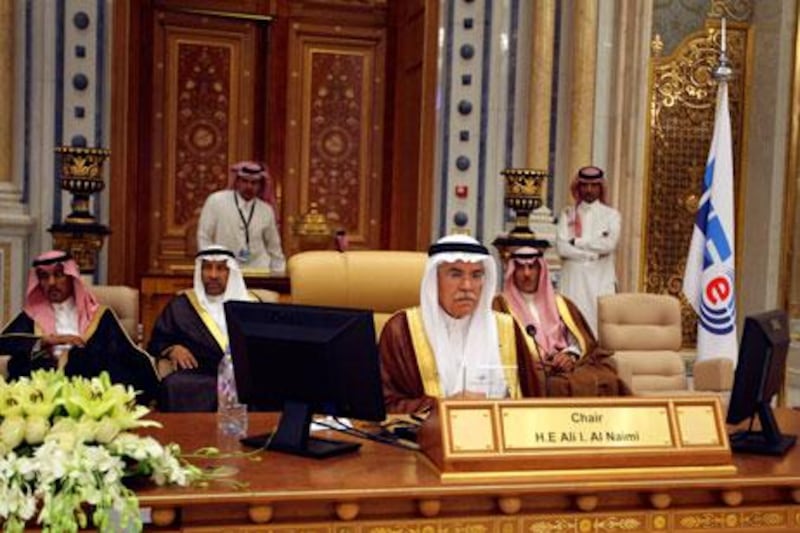RIYADH // Opec held back from releasing extra oil to cover disruptions in Libya as world prices hit their highest level in two years.
Oil producer and consumer nations meeting in Riyadh agreed there was no immediate shortage of oil on world markets, and Saudi Arabia and the UAE said they stood ready to compensate for any future supply gap.
Libya's oil and gas operations were rudderless and vulnerable after days of violence during which production was cut, several senior officials left their posts and banks closed, executives said.
Oil prices hovered near their highest level in two years yesterday. Brent hit $108.70 on Monday, its highest since the onset of the global financial crisis in 2008, and was trading at about $107 in the late afternoon.
______________________________
More: To read all our stories on the unfolding Libyan situation click here to vist our special topics page.
Extra: For wider coverage of unrest in the Middle East click here.
______________________________
Mohammed al Hamli, the UAE Minister of Energy, said Opec was worried by the situation in Libya.
"Opec is very responsible, and if the market needs more oil I can assure you it will be delivered," he said. "We are watching very closely the situation. We want just to make sure the markets are well supplied."
Daniel Poneman, the US deputy energy secretary, said rising demand and concerns over the Middle East were driving oil prices higher, but agreed there was no shortage at the moment.
Ali al Naimi, the Saudi oil minister, vouched a prompt response to any shortfall.
"When we see a shortage in supply, we will rectify it immediately. We have the means, the supply, we have the crude oil available," he said.
Libya normally exports 1.4 million barrels of oil per day (bpd) and 370 billion cubic feet of natural gas annually, most of it to Europe. Italy is particularly reliant on Libyan supplies, with 12 per cent of its gas coming from the north African country via a pipeline under the Mediterranean Sea.
Wintershall, the oil and gas exploration arm of BASF, said it was winding down its Libyan oil production of as much as 100,000 bpd.
Eni, the biggest operator in Libya with 252,000 bpd of output in 2009, said it was repatriating non-essential staff but that its operations were unaffected. Several other foreign operators have withdrawn workers and stopped drilling.
A senior executive at a European oil company that produces and trades Libyan crude said his company was unable to export on Monday because Libyan banks were not supplying letters of credit. Several senior Libyan oil officials had left their posts, he said.
Prince Abdulaziz bin Salman bin Abdulaziz Al Saud, Saudi Arabia's assistant to the minister of petroleum, said the world market was amply supplied.
"Stocks are at quite a comfortable level, which is quite reassuring to both producers and consumers," he said. "Saudi Arabia is focused on … how the market balance is. Is it sufficiently supplied? The answer is yes, abundantly. So does the situation warrant any kind of intervention? I don't think so."
Opec currently pumps 29.3 millionbpd. It has 6 million bpd of spare production capacity, mostly in the UAE and Saudi Arabia, after the drastic cuts that followed the financial crisis in 2008.
"Saudi Arabia is focused on a sustainable price rather than episodic price," Prince Abdulaziz said. "Everybody learned a very expensive lesson from 2008. The idea of having a price of $147 which will not last for a month and then prices falling to $35, I would rather go for a range of $70 to $80, which is sustainable and justifiable."
Representatives from oil-importing nations saw a different picture.
"The market is tight," said Nabuo Tanaka, the executive director of the International Energy Agency (IEA), which represents 28 energy importing nations. "If a small disruption happens, it may cause a [price] spike."
Charles Hendry, the UK minister of energy, said higher oil prices were affecting economic growth and pushing consumers towards alternative energy sources.
"We do recognise that high oil prices do have an impact on our economy. They were a contributing factor to the global downturn a couple of years ago, and so we are very worried if prices start going up too high," he said.
The IEA oversees a stockpile of oil equivalent to 90 days of demand in the Organisation for Economic Co-operation and Development, a grouping of the world's most developed economies.
* with agencies





